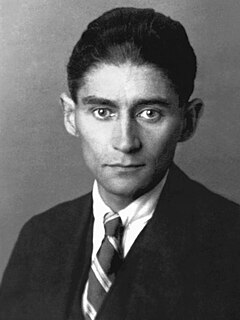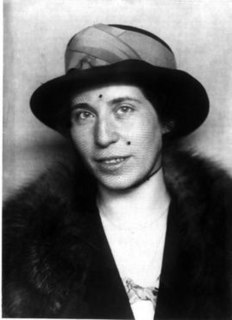
Franz Kafka was a German-speaking Bohemian novelist and short-story writer, widely regarded as one of the major figures of 20th-century literature. His work fuses elements of realism and the fantastic. It typically features isolated protagonists facing bizarre or surrealistic predicaments and incomprehensible socio-bureaucratic powers. It has been interpreted as exploring themes of alienation, existential anxiety, guilt, and absurdity. His best known works include the short story "The Metamorphosis" and novels The Trial and The Castle. The term Kafkaesque has entered English to describe situations like those found in his writing.

Max Brod was a Czech German-speaking Jewish, later Israeli, author, composer, and journalist. Although he was a prolific writer in his own right, he is best remembered as the friend and biographer of writer Franz Kafka. Kafka named Brod as his literary executor, instructing Brod to burn his unpublished work upon his death. Brod refused and had Kafka's works published instead.

"The Judgment", also translated "The Verdict", is a short story written by Franz Kafka in 1912, concerning the relationship between a man and his father.

Hugo Bergmann was an Israeli philosopher, born in Prague.

Felix Weltsch, was a German-speaking Jewish librarian, philosopher, author, editor, publisher and journalist. A close friend of Max Brod, Ludwig Winder and Franz Kafka, he was one of the most important Zionists in Bohemia.

Oskar Baum was a Czech music educator and writer in German language. Baum was the son of a Jewish cloth goods merchant in Plzeň. He had vision problems from the time of his birth. At eight, he lost the sight in one eye and at the age of eleven, during a scuffle, he lost his sight completely. Since he could no longer participate in the school, the class teacher sent him to Vienna to the Israelite Institute for the Blind, a high school. There he trained as a music consultant and learned the organ and piano. In 1902, he put aside his teaching degree and returned to Prague. Baum earned his living as an organist and cantor in a synagogue; later he became a piano teacher.

"Description of a Struggle" is a short story by Franz Kafka. It contains the dialogues "Conversation with the Supplicant" and "Conversation with the Drunk"

Robert Weltsch was a journalist, editor and prominent Zionist.

Franz Kafka, a German-language writer of novels and short stories who is regarded by critics as one of the most influential authors of the 20th century, was trained as a lawyer and later employed by an insurance company, writing only in his spare time.
Heinz Politzer was an internationally recognized academic and writer. As a young man he was forced to flee Nazism first to Palestine and then to the United States, where he taught German language and literature as a professor at the Bryn Mawr College, Oberlin College, and the University of California, Berkeley. He was a literary scholar, published poet, and prominent editor, particularly of Franz Kafka. As a close associate of Kafka's protégé, Max Brod, Politzer coedited with Brod the first complete collection of Kafka's works in eight volumes, published initially by the Schocken publishing house of Berlin during the early years of the Nazi dictatorship and subsequently by the successor firm Schocken Books in New York.

Letters to Ottla and the Family is a book collecting Franz Kafka's letters to his sister Ottla, as well as some letters to his parents Julie and Hermann Kafka. These letters were composed between 1909 and 1924; though Ottla was murdered in the Holocaust, the letters were preserved by her husband and children. Originally published in German in 1974, the letters were translated into English by Richard and Clara Winston and published by Schocken Books in 1982. The English edition also includes photographs of Kafka and Ottla, as well as several images of postcards, letters, and drawings Kafka had sent his sister.

Willy Haas was a German editor, film critic, and screenwriter. He wrote for 19 films between 1922 and 1933, and was a member of the jury at the 8th Berlin International Film Festival.

Alice Herz-Sommer, also known as Alice Herz, was a Prague-born Jewish classical pianist, music teacher, and supercentenarian who survived Theresienstadt concentration camp. She lived for 40 years in Israel, before migrating to London in 1986, where she resided until her death, and at the age of 110 was the world's oldest known Holocaust survivor until Yisrael Kristal was recognized as such.
"Shamefaced Lanky and Impure in Heart" is the name usually given to Franz Kafka's earliest surviving work of fiction, a short story that he wrote in 1902 and that has survived only because it was included in a letter to his friend Oskar Pollak.

Felice Bauer was a fiancée of Franz Kafka, whose letters to her were published as Letters to Felice.

Ottilie "Ottla" Kafka was the youngest sister of Franz Kafka. His favourite sister, she was probably also his closest relative and supported him in difficult times. Their correspondence was published as Letters to Ottla. She was murdered in the Holocaust.

Oskar Pollak was a Czech art historian.

Berta Fanta, was a literary and intellectual figure from Prague. She was at the centre of the Prague intelligentsia with a "salon" meeting at her house.

Ludwig Winder was an Austrian-Czech German-language writer, journalist and literary critic. He escaped Nazi persecution at the start of World War II when he and his family moved to the UK where he spent his last years.

Marie Schmolka was a Czechoslovak Jewish activist and social worker who helped political refugees and Jewish adults and children escape the Protectorate of Bohemia and Moravia in the lead-up to World War II. She was a member of WIZO and WILPF. She had previously helped refugees from Germany who fled to Czechoslovakia after the Nazi rise to power. Schmolka headed the newly founded Czechoslovak Refugee Committee, and also chaired local HICEM. In July 1938, she represented Czechoslovakia at the Évian conference.


















